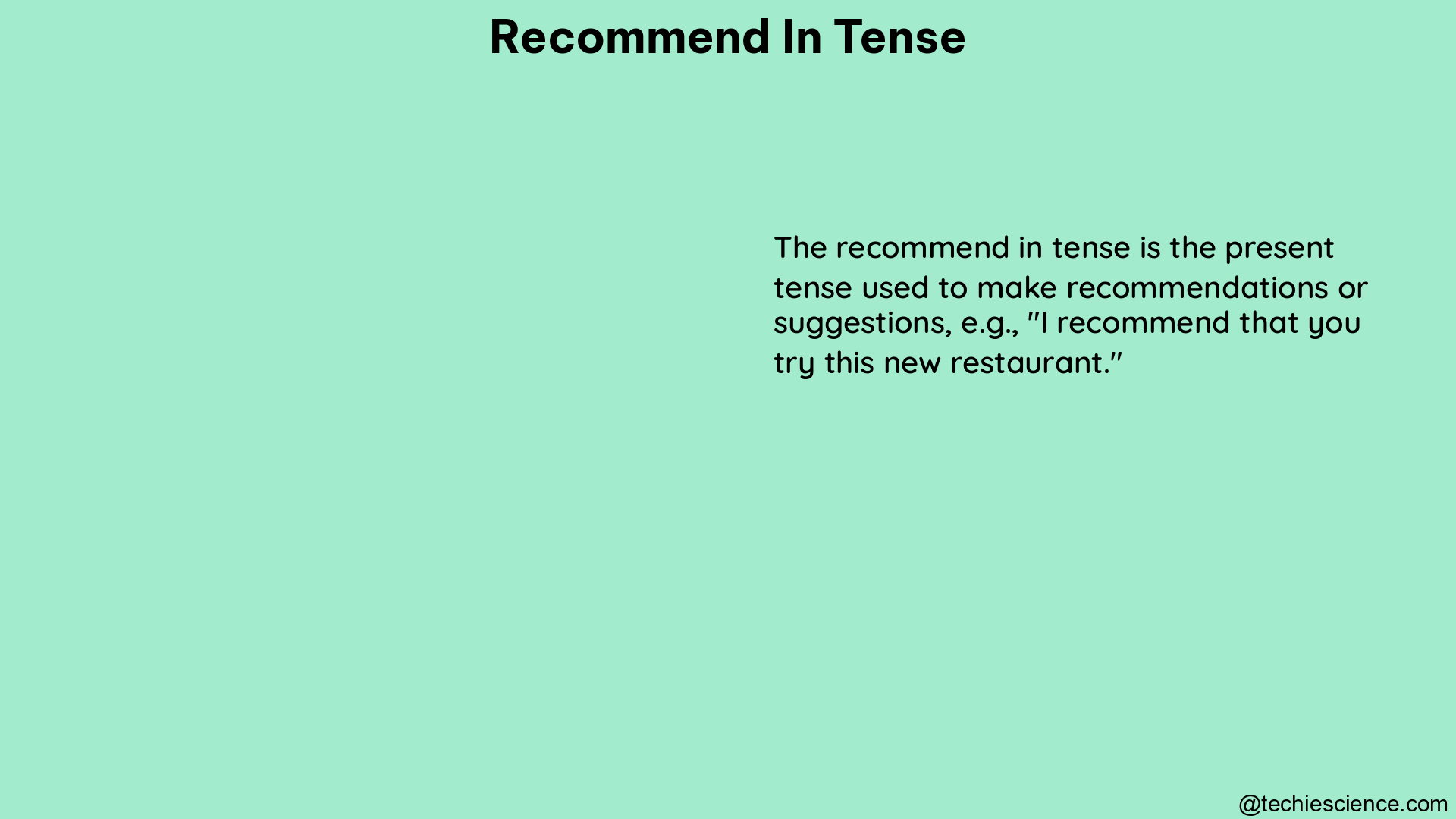The verb “recommend” is a versatile and commonly used word in the English language, and understanding its conjugation in different tenses is crucial for effective communication. This comprehensive guide will delve into the intricate details of using “recommend” in various tenses, providing you with a thorough understanding of this essential verb.
Present Tense
Simple Present
In the simple present tense, the conjugation of “recommend” follows a straightforward pattern:
- I recommend
- You recommend
- He/She/It recommends
- We recommend
- You recommend
- They recommend
For example, “I recommend this book to all my friends” or “The teacher recommends that we read the assigned chapters.”
Present Continuous
The present continuous tense of “recommend” is used to express an ongoing or temporary action:
- I am recommending
- You are recommending
- He/She/It is recommending
- We are recommending
- You are recommending
- They are recommending
For instance, “I am currently recommending this new restaurant to all my colleagues” or “The sales team is recommending the latest product line to our customers.”
Past Tense

Simple Past
The simple past tense of “recommend” is used to describe actions that occurred in the past:
- I recommended
- You recommended
- He/She/It recommended
- We recommended
- You recommended
- They recommended
For example, “I recommended that movie to my friend last week” or “The financial advisor recommended a diversified investment portfolio to the client.”
Past Continuous
The past continuous tense of “recommend” is used to express an ongoing or temporary action in the past:
- I was recommending
- You were recommending
- He/She/It was recommending
- We were recommending
- You were recommending
- They were recommending
For instance, “I was recommending the new software to the team during the meeting” or “The professor was recommending several research papers to the students.”
Perfect Tenses
Present Perfect
The present perfect tense of “recommend” is used to describe actions that have been completed before the present moment:
- I have recommended
- You have recommended
- He/She/It has recommended
- We have recommended
- You have recommended
- They have recommended
For example, “I have recommended this restaurant to several of my friends” or “The company has recommended the new product line to all its customers.”
Past Perfect
The past perfect tense of “recommend” is used to describe an action that was completed before another past action:
- I had recommended
- You had recommended
- He/She/It had recommended
- We had recommended
- You had recommended
- They had recommended
For instance, “I had recommended the book to my friend before she decided to read it” or “The sales team had recommended the new product line to the clients before the launch event.”
Future Perfect
The future perfect tense of “recommend” is used to describe an action that will be completed before a future point in time:
- I will have recommended
- You will have recommended
- He/She/It will have recommended
- We will have recommended
- You will have recommended
- They will have recommended
For example, “By the end of the week, I will have recommended this course to all my colleagues” or “The company will have recommended the new software to all its clients by the end of the month.”
Future Tense
Simple Future
The simple future tense of “recommend” is used to express an action that will occur in the future:
- I will recommend
- You will recommend
- He/She/It will recommend
- We will recommend
- You will recommend
- They will recommend
For instance, “I will recommend this book to my book club” or “The financial advisor will recommend a suitable investment plan for the client.”
Future Continuous
The future continuous tense of “recommend” is used to describe an ongoing or temporary action in the future:
- I will be recommending
- You will be recommending
- He/She/It will be recommending
- We will be recommending
- You will be recommending
- They will be recommending
For example, “I will be recommending the new software to the team during the upcoming meeting” or “The sales team will be recommending the latest product line to all our customers in the coming weeks.”
Conditional Tenses
Conditional
The conditional tense of “recommend” is used to express a hypothetical or conditional recommendation:
- I would recommend
- You would recommend
- He/She/It would recommend
- We would recommend
- You would recommend
- They would recommend
For instance, “I would recommend this restaurant if you’re looking for a nice dinner spot” or “The financial advisor would recommend a more conservative investment strategy if the client has a low-risk tolerance.”
Conditional Perfect
The conditional perfect tense of “recommend” is used to describe a hypothetical recommendation that would have been made in the past:
- I would have recommended
- You would have recommended
- He/She/It would have recommended
- We would have recommended
- You would have recommended
- They would have recommended
For example, “I would have recommended this book to you if I had known you were interested in the topic” or “The sales team would have recommended the new product line to the client if they had been aware of the customer’s specific needs.”
Imperative
The imperative form of “recommend” is used to give a direct recommendation or suggestion:
- Recommend (you)
For instance, “Recommend a good Italian restaurant in the city” or “Recommend the best hiking trails in the area.”
By mastering the intricacies of using “recommend” in various tenses, you can effectively communicate your recommendations, suggestions, and opinions in a wide range of contexts, from personal conversations to professional settings.
References
- https://en.pons.com/verb-tables/english/recommend
- https://www.wordreference.com/conj/enverbs.aspx?v=recommend
- https://promova.com/past-tense-of/recommend
- https://www.theconjugator.com/english/verb/to%2Brecommend.html
- https://conjugator.reverso.net/conjugation-english-verb-recommend.html

Hi…. I am Goutam Datta. I have completed a double M. A. in English and B. Ed. I am a creative writer. Currently, I am a part of the LambdaGeeks.